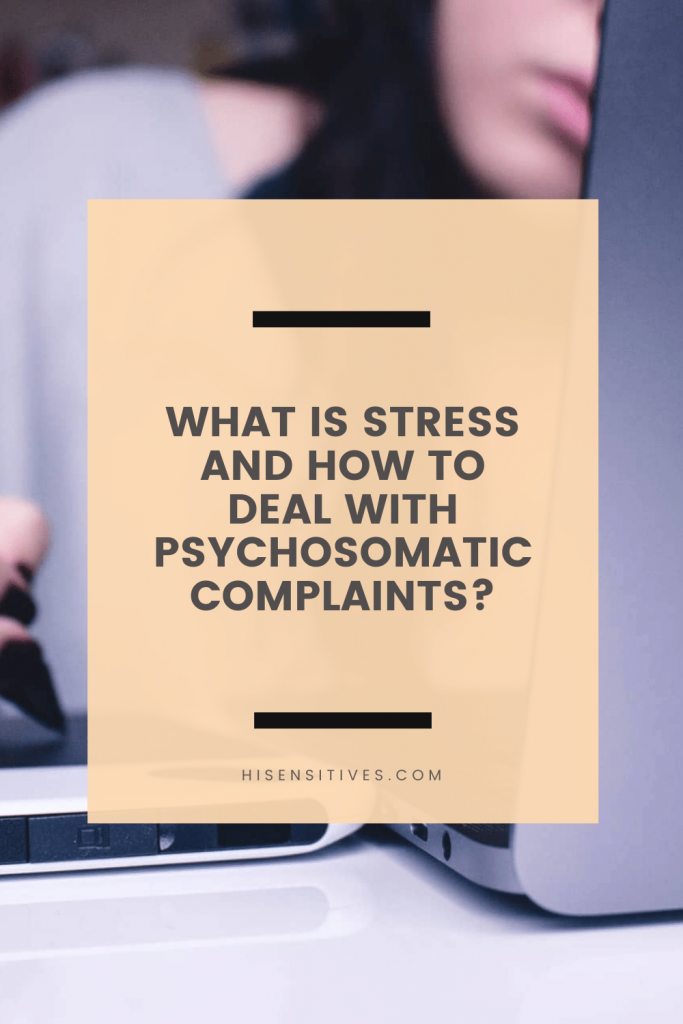In this article, guest writer Nikki deep dives into the topic stress and how to deal with psychosomatic symptoms.
Hey there, lovely readers! We want to be completely transparent with you. Some of the links in this blog are affiliate links, which means if you click on them and make a purchase, we may earn a small commission at no additional cost to you. 😊
We only recommend products and services we genuinely believe in and have personally used or researched. Your support through these links helps us keep bringing you valuable content, so thank you for being amazing!
Estimated reading time: 13 minutes
Next to being an autism coach, I’ve studied to become an all-round counselor. One of the subjects I learned more about during my education, was stress.
Here, I discovered that stress is actually quite common in highly sensitive people. Consequently, they burnout a lot quicker than the regular Joe. There are a couple of reasons for that, which I would like to explain in this article.
There are tips and tricks to deal with chronic stress, which I will share with you. Next to that, you will learn how to lower the levels of cortisol in your body, which are a product of feeling chronically stressed-out.
Here’s What You’ll Discover:
What Is Stress?
Today, the term stress is actually an umbrella term. Stress is an English word and literally means ‘tension’ or ‘pressure’.
Stress is not necessarily negative, although the word is often used that way these days. It is usually automatically associated with work situations. But actually, stress is also possible in other situations, so also with fun things.
The following types of stress are most common:
- Work stress;
- Relationship stress;
- Holiday stress;
- Exam stress;
- Money stress;
- Anticipation stress;
- Memory stress;
- Post-traumatic stress.
Stress permeates all levels of existence. When someone feels stressed, it affects the body, thoughts and behavior. For this reason, the symptoms of stress are classified into three levels: physical, psychological and behavioral.
Factors For Experiencing Stress
Not everyone is equally sensitive to stress. This has to do with several factors:
External Factors Of Stress
People experience stress when they perceive something as threatening. This experience then feels threatening to their mental or physical well-being.
However, not everyone experiences the same stressful situation in the same way. This is because of the way they give meaning to a situation. This concerns the following characteristics:
- Extremity: Some events are more drastic than others. Some are so drastic that everyone experiences them as stressful. Think of wars, (nature)disasters or pandemics.
- Predictability: An event is more likely perceived as stressful if someone didn’t see it coming. You can prepare yourself for stressful events that show a certain regularity or that have been announced. This helps with the perceived stress level.
- Controllability: The stronger we feel that we have control over a situation, the less stressful we experience the event. Situations such as someone’s death, serious illness or dismissal cannot be controlled and are therefore experienced as very stressful.
- The extent to which self-image is tested: Events that require a great deal of adaptability can be extremely stressful. Examples include emigration, physical violence or (medical) gaslighting. People often start to doubt themselves because of such situations, which can cause serious stress.
Next to these external factors, there are also some personal traits that can make a person more susceptible to stress.
Type A Versus Type B Characteristics:
Psychologists Meyer Friedman and Ray Rosenman have described two different behavioral styles in the past: type A and type B.
People of type A often have the same characteristics. They are:
- Ambitious.
- Goal oriented.
- Dominant.
- Aggressive.
- Rushed.
- Multi-taskers.
- Impatient.
- Talkers.
- Difficult relaxers.
- Doers.
Type B people also have similarities. They are often:
- Quiet.
- Thoughtful.
- Flexible.
- Attentive.
- Easy relaxers.
- More accepting with adversity.
- Dreamers.
You will probably notice the difference between the two types.
It is not strange to assume that type A will experience much more stress than type B. And it is.
However, it occurs rarely that someone is completely type A or type B. That is why people nowadays also talk about type C. People with type C combine characteristics of both.
For example, they are just as calm as type B, but they are also at risk of developing disorders like type A, because they sacrifice themselves too much and let everything happen too passively, for example.
Personality Traits
One way to look at somebody’s personality, is using the Big Five. This model consists of the five most important personality traits, why someone can score high or low. The Big Five looks at:
- Neuroticism vs Stability: How emotionally stable and adjusted someone is.
- Extraversion vs Introversion: How one is in relation to others.
- Openness to experience vs closeness: How someone experiences the world and whether someone uses their intelligence/creativity.
- Care vs carelessness: How one handles material and personal matters.
- Kindness vs hostility: How one is directed toward others.
These five factors are the most fundamental personality traits. Everyone can be characterized on each of these five dimensions in order to get a good picture of their personality. There also appears to be a logical relationship between these personality traits and stress:
- Neuroticism: Neurotic people are more sensitive to stress and vulnerable than emotionally stable people because they are more anxious in life. In addition to anxiety symptoms, they are also more likely to suffer from insomnia and physical ailments, for example. They also experience less satisfaction in life.
- Introversion: Introverts generally experience more stress than extroverts because they express themselves differently. Extroverted people certainly experience stress, but then it is often about a more positive form of stress, also called eustress.
- Openness: People who are more open to experience and have progressive ideas can be more stressed than people who are more conservative and always think in the same patterns. However, open people probably experience more satisfaction in their lives. They have a broader outlook on life and perceive stressful situations as challenges to grow rather than problems.
- Hostility: People who are positively oriented towards others can count on more support and less hostility, and therefore experience less stress.
Stressful Behavioral Patterns
Next to external factors and being a certain type and having particular personality traits, stressful behavioral patterns can also cause somebody to experience more stress.
These don’t have anything to do with what kind of personality you have, but are more like typical behavioral patterns that can cause stress. This concerns behavior that is not realistic and that has a certain thought pattern behind it.
These are often unconscious and therefore work against someone. The following behavioral patterns are common, to a greater or lesser extent:
- Fanatic perfectionism: Everything has to be perfect and mistakes are a sign of weakness. With this thought, a person can put a lot of pressure on themselves and also increase it regularly. For example, many workaholics suffer from this thought pattern.
- Disaster thinking: Constantly thinking about all the possible disasters that could occur. This overthinking causes stress. As soon as even the smallest thing goes wrong, everything goes wrong in the fantasy.
- Low frustration threshold: Can tolerate little or nothing. As soon as there is criticism or setback, people often complain and/or stop.
- Wanting to be everyone’s friend: Wanting to be friends with everyone and everything and always wanting to be liked. It is clear that this will never work. But it is the fear of not being accepted that is behind this.
- Making demands on others and the world: The world and other people must adhere to certain, often self-invented, rules. This usually does not work, which (unconsciously) can cause a lot of stress.
What Happens In The Body When You Experience Stress?
When you experience stress as a highly sensitive person, there are multiple things that happen in your body. Below, I summarized the most important changes:
The Nervous System:
The nervous system in particular plays an important role in experiencing stress. The human nervous system divides into two major parts: an autonomous and an animate nervous system. The animal nervous system is about conscious processes and the autonomic nervous system is about important, unconscious processes.
The autonomic nervous system divides into two systems, which are alternately more and less active: the sympathetic system and the parasympathetic system.
The sympathetic system brings the body into an active state. During the day, most people are largely in this condition. The parasympathetic system brings the body into a state of rest, in which it can recover and rebuild. This is the case during eating (when digestion is active) and sleeping.
When someone is in a state of increased stress, the sympathetic system prevails. You are alert and ready to take action. This in turn affects, for example, your digestive system.
The Hormonal System
Another system that plays its influence on stress, is the hormone system. Hormones are chemicals that play an important messenger role in the body. For example, they are involved in all growth processes, metabolism and reproduction. But they also play their part in stress.
The hormone system and the sympathetic system play an important role in the process of a stress response. As soon as someone experiences a stressful event, two processes take place:
- The production of the hormone cortisol increases.
- The production of the hormones adrenaline and noradrenaline.
Cortisol causes an increase in blood sugar, so that the body has a lot of energy immediately available. It is also referred to as the stress hormone. Adrenaline and noradrenaline enable the body to make extra effort quickly. Noradrenaline only has a blood pressure increasing effect, while adrenaline has a broader effect. Both hormones provide the ‘fight or flight’ response that I will talk about in a moment.
Fight-or-Flight Reactions
In the past, when people were in a dangerous, stressful situation, they had to react quickly to stay alive. The stress response was therefore a useful phenomenon.
In such a moment you decide (often unconsciously) how you react to the stress: do you run away or do you fight?
The psychologist Walter Cannon has examined this stress response and called it the “fight-or-flight response.” Several bodily changes take place during this reaction, such as increasing heart rate, increasing blood pressure, slowing digestion, dilating pupils and increasing blood clotting, in case of damage.
After this acute stress reaction, a lot of energy is available. Something has to be done about that.
However, nowadays we experience few life-threatening situations, that was different with prehistoric humans. However, this reaction is still activated, but there are different situations in which this occurs. The physical dangers have given way to social and/or psychological stress.
Psychosomatic Complaints
When you experience long-term stress, you can develop psychosomatic complaints. “Psycho” stands for mind, where thoughts, behavior, emotions and social influences are stored. And “soma” stands for body. Psychosomatic complaints therefore consist of a combination of mental and physical complaints.
A complaint is called psychosomatic if your mind makes your body sick. Your physical complaints are basically triggered by psychological factors, such as chronic stress. Psychosomatic complaints actually do entail real physical complaints. However, often nothing is found on medical examination.
Sometimes, it’s the other way around. You get physically sick, which makes you experience a lot of stress. As is known, there is a close relationship between body and mind. Both are connected and influence each other continuously.
For example, because of physical pain, you can feel mentally uneasy and develop psychological problems, such as a burn-out. Therefore it’s very important to take care of your body as well as your mind.
Psychosomatic complaints can vary greatly. And not everybody experiences the same complaints when chronically stressed. For reference, I have compiled a list with both physical complaints and psychological complaints.
Physical Complaints
- Fatigue;
- Tension in the muscles;
- Headaches;
- Changes in digestion and stomach aches;
- Trembling and twitches;
- Ringing in the ears;
- High blood pressure;
- Dizziness and light headedness;
- Shallow breathing;
- Apathy;
- Dry mouth and throat;
- Excessive sweating;
- Skin rashes or worsening of eczema or psoriasis;
- Excessive hair loss;
- Canker sores in the mouth;
- A feeling of tightness in the chest;
- Sleeping issues.
Psychological Complaints
- Confusion;
- Forgetfulness;
- Lack of focus and concentration;
- Intolerance of sensory and/or social input;
- Agitation;
- Depressive feelings;
- Dissatisfaction;
- Intolerance to frustration;
- Feeling extra vulnerable;
- Anxiety;
- Mood swings;
- Extreme worrying;
- Quick overwhelm by emotions.
This is a short list of psychosomatic complaints you can experience when being overly stressed. When not looked after, these complaints can turn into ailments, such as migraines, heart conditions, stomach ulcers, neurasthenia or autoimmune diseases.
Psychological complaints can turn into depression, an anxiety disorder, burnouts or PTSD. So, if you experience a large amount of stress and feel any of the psychosomatic complaints listed above, please contact your doctor or therapist. They can help you and prevent things from getting worse.
How To Relieve Stress
Luckily, there a multiple ways to relieve stress. And most of them are easily accessible and doable from home, which hopefully will make it more convenient to do something about your stress.
In this article, I’ve listed a few of them, but please know that there are many ways to do it. So if these don’t float your boat, I’d suggest searching this website for other options.
Recovery of Energy and Physical Stamina
It may sound crazy, but for most people who experience chronic stress, just taking rest often doesn’t work well enough. Psychosomatic complaints can reinforce each other.
For example, stress can make it difficult to fall asleep and because of a lack of sleep you handle a lot less during the day, which in turn causes more stress.
Once those patterns are there, they often perpetuate themselves. By restoring the energy balance and physical stamina, you can often break these kinds of patterns. Therefore, recovery is often accompanied by active activities.
An energizing balance between sport, activity and rest helps to recover faster from chronic stress or burnout. And the word balance is really important here.
In addition, the intensity of movement also has an influence. Relaxation exercises and activities can also help. Look for a nice breathing exercise that fits your needs, make meditation part of your day or go to the wellness center to pamper yourself.
Some Tips To Keep In Mind
- Take plenty of breaks throughout the day. Especially if you feel that you are working too slowly because of your exhaustion. Do not try to compensate for this by continuing to work!
- Do not exercise too intensively. Certainly not when the sport is also accompanied by haste. Competitive sports can also increase stress. It is a better idea to go for a walk, cycle or garden, for example. Sports such as yoga or tai chi are also a better idea than, for example, a game of football.
- When you’re stressed, you probably need extra sleep and want to take a nap more often. This is of course okay, but do this as much as possible before 3 p.m. so as not to disturb your sleep-wake rhythm. Try to reduce it after a week or three, so that you can build up a normal pattern again.
- Try to follow a good daily structure as much as possible. It may help to get up and go to bed around the same time every day, eating, shopping, and resting. This way you can give your busy head some rest. Set an alarm on your phone to get used to a structure, if you’re comfortable doing so.
- Gather some support around you. Support from friends and family is still often underestimated. Many people find it annoying to be a burden to others, but it has really shown that this can help you regain your energy. For example, delegate some tasks to your husband, give your children more chores in and around the house or ask that friend to run that errand for you. Many people like to do something for someone else. But you probably recognize that, which is why you probably feel so much stress at the moment.

Good Luck!
Hopefully, these tips help you to relieve stress as a highly sensitive person. Remember to be easy on yourself and allow yourself to rest. And if nothing helps, don’t be afraid to consult a professional to help you in your recovery.
Good luck with reducing stress! If you’d like to revisit this article at a later moment, make sure to pin this article to your Pinterest-board or to share it on other social media channels through the buttons below.






